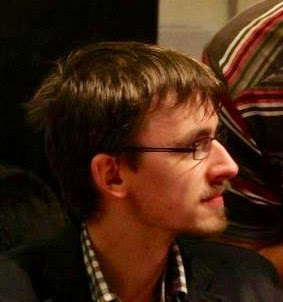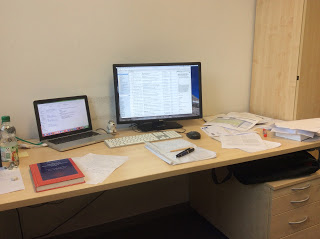I am Ondrej Cernotik, and This is How I Work
 Today I am interviewing Ondrej Cernotik. Ondrej is a PhD student in theoretical physics at the Leibniz University Hannover, Germany. He focuses on quantum optics with applications to quantum information processing. More specifically, he is investigating ways to convert weak microwave signals to light (or the other way around) and the applications this can have for quantum information processing and quantum communication. He got his master’s degree in optics at Palacky University Olomouc, Czech Republic (his home country); during this time he also spent a year as an exchange student at Umea University in Sweden. He also blogs about quantum physics and my work at cernotik.wordpress.com and tweets as @cernotik.
Today I am interviewing Ondrej Cernotik. Ondrej is a PhD student in theoretical physics at the Leibniz University Hannover, Germany. He focuses on quantum optics with applications to quantum information processing. More specifically, he is investigating ways to convert weak microwave signals to light (or the other way around) and the applications this can have for quantum information processing and quantum communication. He got his master’s degree in optics at Palacky University Olomouc, Czech Republic (his home country); during this time he also spent a year as an exchange student at Umea University in Sweden. He also blogs about quantum physics and my work at cernotik.wordpress.com and tweets as @cernotik.
Current Job: Research assistant, Leibniz University Hannover
Current Location: Hannover, Germany
Current mobile device: iPad Air
Current computer: MacBook Pro
Can you briefly explain your current situation and research to us?
I’m doing a PhD in theoretical physics in Germany. The German system means that I do not have to attend any courses or pass any exams. I don’t even have to teach (because I am employed on an EU project which requires me to spend all my time on research) so all I have to care about is my dissertation. That comes with many advantages — I can really focus on the science and don’t have to stress about exams or teaching loads — but on the other hand, no teaching experience will probably be a bit of a disadvantage when looking for a postdoc (I want to stay in academia after graduation).
Working in theoretical physics means that I never get in a lab and all my work is done in my office. My work thus basically consists of developing new ideas that can then be tested in an experiment by someone else. For this, I do either calculations with pen and paper or some numerical simulations on my computer, so there is a lot of maths and programming involved. Specifically, I am looking at how mechanical oscillators (tiny vibrating membranes, mostly) can be used to convert microwave signals to light and vice versa. This is something that is easy to do with strong signals but not so much when the waves involved are very weak.
What tools, apps and software are essential to your workflow?
First, there are the analog tools. I do many calculations with just pen and paper. I am also a bit old-fashioned and like keeping all sorts of notes on paper so there are always notebooks and loose sheets lying around. Sometimes, I switch to a whiteboard — either when discussing something with my colleagues or even when doing maths by myself so I do not sit at my desk all day.
Then, there is a lot of software that I couldn’t live without. For my physics, Mathematica and IPython (with the QuTiP — Quantum toolbox in Python — module) are crucial. Like many STEM people, I use LaTeX for scientific writing. Then there is Inkscape for creating posters and figures for my papers and Mendeley to help me to stay on top of research literature. Finally, I use Evernote for various notes and to keep track of where my research projects are going.
For social networks, there is WordPress for my blog (and following other blogs) and Hootsuite for Twitter. I used the standard Twitter app but switched recently since with Hootsuite I can schedule tweets and follow hashtags easily (the most important hashtags for me are #phdchat, #acwri, and #scicomm). When I stumble upon something I want to read later, I save it to Pocket. And because I don’t get to see my family and friends in the Czech Republic so often, Skype is a must.
I’m currently trying to find the best tools for making presentations; I used LaTeX beamer for a long time since it makes it easy to include mathematical expressions but the output is usually not that aesthetically pleasing. I did my last talk in LibreOffice but did not enjoy that experience much either. Next, I want to try Keynote, maybe Prezi…there are simply too many options!
What does your workspace setup look like?
I keep all my work at the university and do not bring it home unless I really have to. That means I have no home office and get all my work done in my university office which is pretty standard — a desk with a computer, a bookcase, and a whiteboard on the wall. And since I am a theoretical physicist, I do not have a lab.
What is your best advice for productive academic work?
I do not like giving general advice because everyone will prefer a different workflow. But there is one thing — create a routine and stick to it. Try to work regular hours, include regular slots for all sorts of activities (reading, writing, teaching, meetings, and so on). And find what schedule works best for you.
But do not stick to the schedule at all cost. If you have a week when nothing goes according to plan, do not force it and leave work earlier to recharge in whatever way you like. When you are on the right track, you can stay longer and catch up on what you did not manage to do when things did not go so well.
How do you keep an overview of projects and tasks?
I am not really organised when it comes to keeping track of projects and tasks. Some things, I simply keep in my mind — that’s the case for things that will get done on the same or the next day (like the next step in a long calculation). For more complex issues (such as remembering all possibilities to explore when studying a problem), I use Evernote to record ideas for what to do next. To keep track of the stuff I did, I usually write a report in LaTeX. This has several advantages — I can easily keep my supervisor updated on all the technical details that are too insignificant to be discussed in detail during meetings and writing things down helps me to build a solid picture of the problem I am working on. And it is a great writing exercise which is useful when one needs to transform the notes into a research paper or, later on, a dissertation. And for lots of other things, there are random hand-written notes
Besides phone and computer, do you use other technological tools in work and daily life?
The only mobile device I really use is my tablet. (My phone is a rather old one that cannot do much apart from voice calls and texts.) It is not that crucial for my everyday activities but it comes in handy when travelling to conferences. It is much easier to carry around and operate a tablet than a laptop.
What do you listen to when you work?
That depends a lot on my mood and the type of work. Generally, I listen only to instrumental music when working because any singing easily distracts me. For the main scientific work (any mathematical derivations or numerical simulations) I usually stick to film music (nothing motivates scientific work better than a good science fiction soundtrack — one then feels like saving the world!). For reading or writing I usually have to be absolutely focused and use music only to drown any noise coming from my colleagues (they are usually not so loud, though). And for editing, classical music works best for me.
What’s your sleep routine like?
I try to keep my sleep regular, going to bed before 11 in the evening and getting up around 7:15. Some people might find it strange that I try to stick to this regime also at weekends but it really helps. With a regular routine, I find it much easier to fall asleep in the evening and wake up in the morning.
What’s your work routine like?
I come to work around 8:30 and start by checking emails, mostly to find out what papers have come out. (That might affect my plans for the day — if someone publishes something highly relevant to my work, I try to read it as soon as possible.) There are two large breaks in my work — lunch from 12:00 to 12:45 PM and a coffee break from 3 PM for about 20 minutes. Other fixed points in my schedule are my reading time (every day straight after lunch for about half an hour) and regular weekly meetings with my supervisor (currently Friday afternoon). I usually leave around 5 PM. The rest is filled as needed. This includes my actual scientific work, writing, preparing posters or talks, or attending seminars. If need be, I can also add more reading or discussions with my supervisor. I also try to have a few short breaks (about 5 minutes) scattered throughout the day but I am not too strict about those. If my work is running smoothly, there is not much point in stopping to take a breath, but working for several hours straight is usually too much to do without a small break somewhere in between.

Thanks